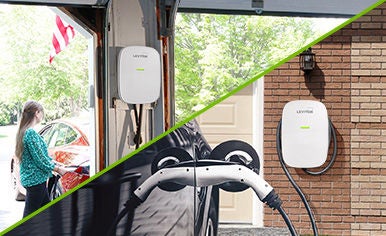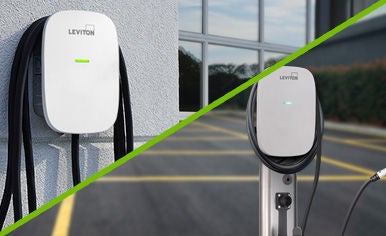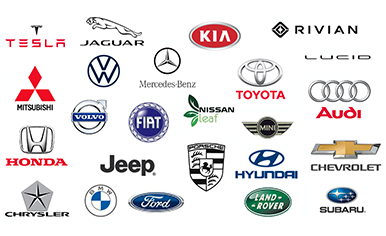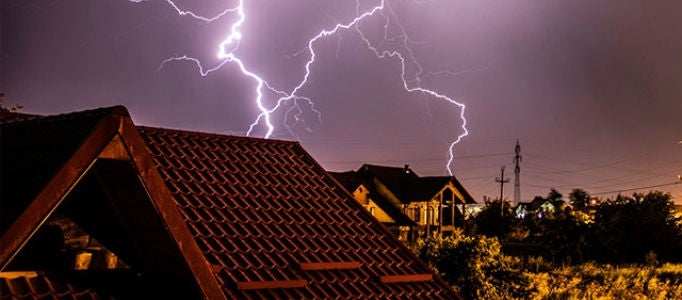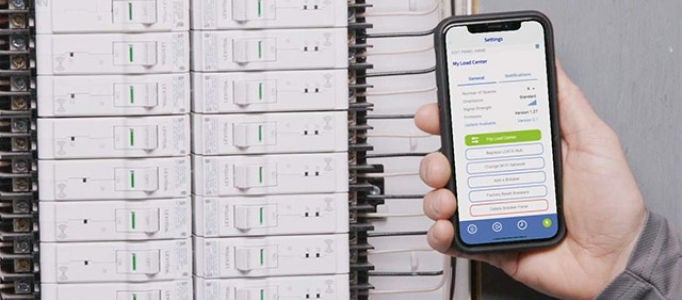There’s a good chance your home has Leviton devices installed. Anything from switches to dimmers, GFCIs to load centers… all designed to make your life easier, safer, and more productive. Your garage should be no different. Installing a Leviton EV charging station gives you safe and secure charging to get you where you need to go.
Quick Links: Back To Home | Property/Business Owners/Fleets | Installers | Distributors | Builders | Car Dealerships
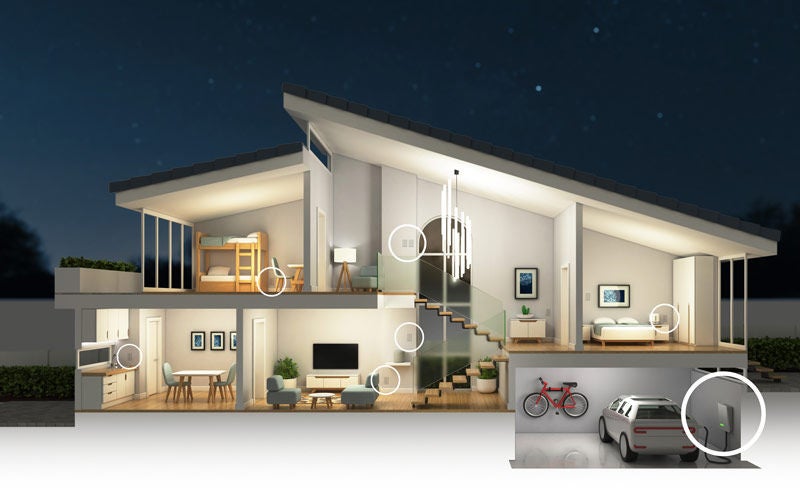
We're flexible to meet the needs of any EV driver, so you don't have to worry...
EV Charging Just Got Smarter
Compatible with the My Leviton App, you can now take control of your entire home, including smart electric vehicle charging, lighting, and load center.
- Schedule charging sessions
- Remotely start/stop charging
- View all smart devices on one dashboard
- View charging status
- Receive fault notifications
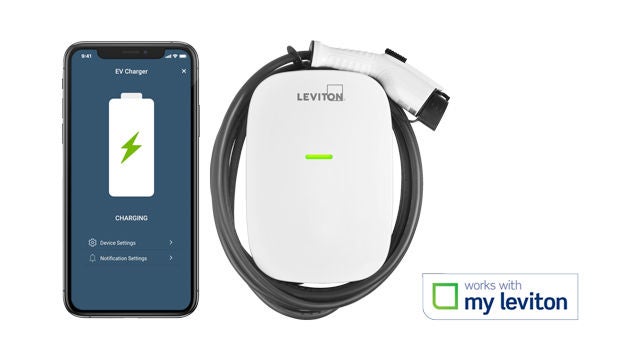
The brand that goes beyond the charger...
At Leviton, we don’t just provide EV chargers, we provide the total EV electrical infrastructure
Frequently Asked Questions
Level 1 charging stations are typically provided with an EV purchase and use a J1772 connector. They are rated 120 Volts and can be plugged into a standard NEMA 5-15 household outlet. Level 1 provides the slowest charging time, averaging 5 miles of range per hour of charging.
Level 2 charging stations are the most common type of charging stations in the US and North America, using a J1772 connector. As of 2022, over 85% of public EVSE ports in the US were Level 2. They are rated 240 Volts and charge faster than Level 1, averaging 25 miles of range per 1 hour of charging. Level 2 charging stations are common for homeowners, workplace, and other commercial/public locations.
DC charging stations, often referred to as "Level 3 Charging Stations", use direct-current to provide quick charging. They use CCS connectors (also known as J1772 combo) and CHAdeMO connectors. They are typically rated 208/480 Volts and charge faster than Level 2, averaging 100-200+ miles of range per 30 minutes of charging (or 200-400+ miles of range per 1 hour of charging) and are common at rest stops, gas stations, shopping malls, and other public locations.
| Level | AC or DC | Miles of Range Per 1 Hour of Charging* | Connector Types |
|---|---|---|---|
| Level 1 | AC | 5 | J1772 |
| Level 2 | AC | 25 | J1772 |
| DC (often referred to as Level 3) | DC | 200-400+ | CCS1, CHAdeMO |
*Charging time may vary depending on the vehicle and battery capacity
- AC Charging – AC power is put into the vehicle from a charging station, and then the converter inside the vehicle converts it to DC power.
- DC Charging – the charging station, with a built in convertor, converts AC to DC, and then the vehicle receives DC power directly from the charger, allowing for faster charging. DC Charging is often referred to as Level 3 Charging
To estimate your cost of charging at home, multiply your vehicle's kWh/100 miles figure by the electric rate for the time of day you'll most often be charging. That figure will tell the cost per 100 miles.
Yes! There are many Federal and State rebates and incentives being offered to promote the widespread adoption of electric and other alternative fuel vehicles, including tax breaks, reduced utility rates and more. Whether you are an EV driver or a business owner, see which apply to you.
Level 2 charging reduces the charge time by up to 5 times versus Level 1 charging. Many customers want a Level 2 charger because it delivers safe, reliable and secure power for electric vehicles. Additionally, Level 2 charging provides the benefit of “topping off” the electric battery in a relatively short period of time.
The following list includes important safety features you should think about prior to selecting a Level 2 EV Charging Station:
- Pick an EV Charging Station with the latest industry standards including meeting Underwriter’s Laboratory and National Electric Code Requirements
- Make sure the manufacturer provides additional safety features such as ground monitoring circuitry and over temperature protection
- Horsepower vs. Kilowatts:
- Gas-powered vehicles are rated in horsepower, whereas electric motors in EVs are rated in kilowatts. One kilowatt is one third more powerful than one horsepower
- MPG vs. MPGe.
- Driving range for gas-powered vehicles are often referred to as miles per gallon (MPG). The EV equivalent is miles per gallon equivalent and can be used comparatively.
- Range anxiety is a common pushback against purchasing an Electric Vehicle. However, as EVs are increasing in popularity, the number of charging stations available is increasing as well. You can charge your car at home, at work, and at public charging stations to ensure you always have a charged vehicle. View this map. Many EVs have an app that helps you find nearby charging stations when you are getting low on battery.
- More EVs are being released that have larger mile ranges to help combat range anxiety. If you are looking for a longer range vehicle, choose an EV over a hybrid!
While the popular Tesla Superchargers in public spaces can ONLY charge Tesla vehicles, you can charge your Tesla virtually anywhere, including Leviton stations! Every Tesla purchase comes with a J1772 adapter that will allow you to use Level 2 stations, and Tesla cars can already accept DC charging stations.
There are car settings that don’t allow your car to be unplugged if it’s still charging. You can also set it so that others can freely unplug the charger if you reached a full charge or whatever designated charge you have for your car.
Yes! Both EVs and EV charging stations meet specific safety ratings and are designed to avoid water intrusion. Electric current will not flow through the charging cable to the EV until a proper connection has been made.
While you will be able to turn your EV on while it is plugged in, your EV will read that your port is open and a connector is attached, and will not let you drive.
One way to do this is by having the contractor/installer use an EV tester. These devices take the necessary precautions to ensure your Leviton EV Series charger operates reliably and provides a seamless charging experience. Through the simulation of a vehicle connection, they enable professionals to assess the charger’s ability to connect to Wi-Fi networks, maintain a reliable connection, and communicate with the external systems or mobile applications.
Resources
How can we help you?
Speak to one of our EV Charging Specialists.

